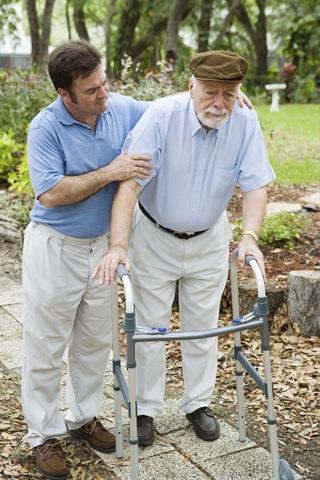Slide 1 of 4: Introduction
Author: Ronald J. Comer, Princeton University

Press the Next button to start this activity
Slide 2 of 4: 20.1 Caretaking: The Physical Toll
This video examines the relationship between caretaking (specifically, caring for family members with dementia), stress, and health. The video focuses on a man who cares for his wife with Alzheimer’s disease. As you watch, you will see the emotional and physical toll that chronic stress takes on him and on other such individuals. The video also features a study by Janice Kiecolt Glaser and Ronald Glaser providing evidence that long-term stress can lower the human body’s immune response.
- Chapters
- descriptions off, selected
- captions settings, opens captions settings dialog
- captions off, selected
This is a modal window.
Beginning of dialog window. Escape will cancel and close the window.
End of dialog window.
This is a modal window. This modal can be closed by pressing the Escape key or activating the close button.
This is a modal window.
Caretaking: The Physical Toll
They've been happily married for 51 years, but now Madge has Alzheimer's.
OK, now lean, now, way back in the shampoo bowl.
No, don't.
Your head back as you can make it.
I can't.
Sure you can. Back you go.
Little bit more, Mrs.-- Mrs.--
No, I can't do it.
She's unable to do anything for herself, and her husband cares for her.
Slightly down, Mr. Rice, please.
Don't do that.
Caring for his wife every moment of the day causes Franklin constant distress.
Well, it isn't easy. One way it's worse than it was in the blinking war, when I was getting shot at. After it was over, you could say to yourself, the son of a gun missed me. And on this, you know it isn't going to get better. It's always going to be worse.
No, don't.
Just a little bit more.
I can't. It hurts.
Just a little more.
No. [INAUDIBLE].
Well, the worst part is the contrast of what she is to what she used to be. Used to manage hospitals and sell real estate, do all the things that successful people do.
It's so cold. I can't take it.
Sure you can.
Jan and Ron Glaser planned a detail study to examine the effects of stress on health. They chose people under continuous high stress, people like Franklin who cared for loved ones with Alzheimer's.
When someone's providing care for a spouse with a progressive dementia like Alzheimer's disease, what you have is a very long-term, very chronic stress that is only, by and large, going to get worse over time. So that for caregivers, they describe in some ways as kind of a living bereavement, as they watch pieces of the person they love disappear over time.
Not surprisingly, the Glasers found that psychological stress had lowered Franklin's immune response.
In a lot of studies, both in animals and human subjects, people find statistically significant differences in different aspects of the immune response as it relates to stress. And that's fine. That's interesting. But the real important question is are those changes big enough to have a health effect? Are they biologically significant as well as statistically significant?
The study went on to address that question by seeing if high stress and low immune function actually impaired the body's ability to heal itself. Small identical wounds were made on the arms of all the volunteers. The Glasers then measured the time it took for the wounds to heal. They found that the wounds of overstressed carers like Franklin took 24% longer to heal than did those of unstressed people. Here at last was a demonstration that stress could lower immune function to the point of affecting your health.
Slide 3 of 4: 20.2 Check Your Understanding
Instructions:
Answer the questions based on the video and your reading of the entire chapter.
Slide 4 of 4: 20.3 Activity Completed!
Activity results are being submitted...